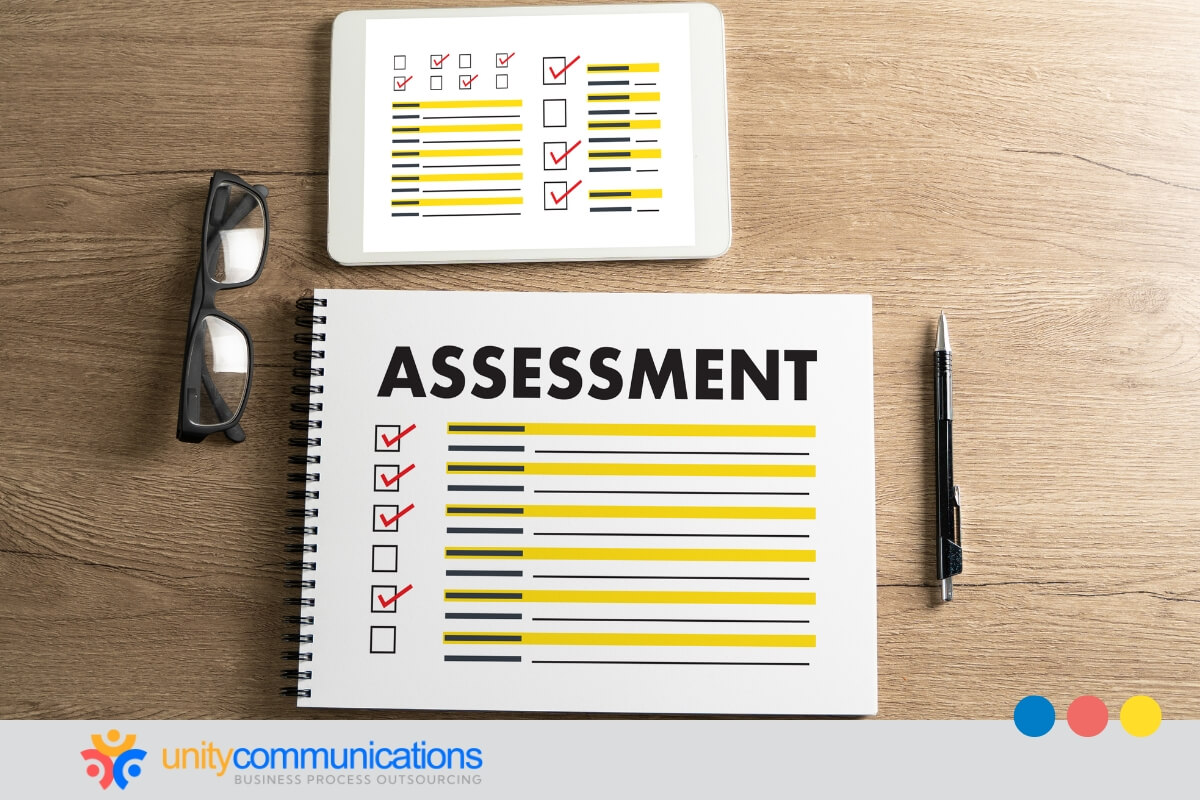IN THIS ARTICLE
Table of Contents
Businesses turn to outsourcing to streamline operations, only to experience a significant decline in product and service quality. What could have caused it?
When outsourcing fails, it is often due to miscommunication, lack of clear expectations, insufficient resources, or an inexperienced outsourcing partner. These issues can lead to missed deadlines, inconsistent work, and unsatisfied customers, harming a company’s reputation.
Businesses can prevent these pitfalls by taking a proactive approach. This article shares nine essential strategies to help ensure quality in skill outsourcing, whether you work with a business process outsourcing (BPO) firm or an outsourced professional.
The importance of quality in skill outsourcing

The global outsourcing market is growing steadily. Statista said it could achieve a compound annual growth rate (CAGR) of 4.33% from 2025 to 2029 and a market volume of $491.53 billion by the end of the forecast period. However, this expansion could bring quality issues as rising demand can lead to inconsistencies in service delivery. To mitigate risks, businesses must implement strong quality assurance measures.
Quality is the foundation of successful skill outsourcing. Whether a company outsources software development, customer support, content creation, or other specialized tasks, maintaining high standards improves efficiency, consistency, and customer satisfaction. Otherwise, businesses experience project delays, reputational damage, and financial losses.
One significant advantage of outsourcing is access to specialized expertise. However, if outsourced professionals or BPO firms do not meet the expected quality benchmarks, businesses could spend more resources on revisions, corrections, or complete rework.
Additionally, quality in outsourcing directly affects a company’s brand reputation. Poorly executed work, such as defective products, inaccurate data, or low-quality customer interactions, can erode customer trust and loyalty.
On the other hand, when outsourcing partners consistently deliver high-quality results, businesses can enhance their brand image, improve customer satisfaction, and build long-term success.
Best practices for skill outsourcing success

If your company is considering outsourcing, remember that BPO and quality control standards must complement each other.
The following tips teach how businesses can maintain high standards in skill outsourcing so that outsourced work meets the objectives and contributes to long-term success.
1. Set clear expectations and quality benchmarks
The foundation of successful outsourcing lies in defining expectations upfront. Document precise project requirements, desired outcomes, and key performance indicators (KPIs) before engaging with an outsourcing partner. A well-structured scope of work ensures that both parties understand deliverables, deadlines, and quality standards.
Setting measurable benchmarks also helps track progress and performance. Outline success metrics such as accuracy rates, response times, or adherence to brand guidelines. A clearly defined definition of quality minimizes misunderstandings and aligns BPO teams with business objectives.
2. Vet and select the right outsourcing partner
Once you set your outsourcing goals, the next critical step is choosing the right outsourcing partner. Conduct thorough research, checking a provider’s experience, past client reviews, and industry expertise. Requesting case studies or samples of previous work can offer valuable insights into a vendor’s capabilities.
Beyond technical skills, cultural fit and work ethics are crucial to outsourcing success. A reliable BPO vendor should demonstrate professionalism, responsiveness, and a proactive approach to problem-solving. Verify credentials, certifications, or compliance with industry standards.
3. Define service-level agreements for accountability
A well-crafted service-level agreement (SLA) is essential for setting performance expectations and strengthening accountability. It defines the scope of work, response times, resolution processes, and penalties for noncompliance. Moreover, SLAs should include quality assurance measures, such as error tolerance levels or uptime guarantees.
This legal framework safeguards both parties and establishes clear guidelines for dispute resolution. It also helps businesses hold outsourcing partners accountable for consistent, high-quality results.
4. Monitor and report performance
Continuous monitoring is key to ensuring quality in skill outsourcing. Businesses should establish a system for tracking performance through weekly or monthly reports, project dashboards, or automated analytics tools.
Regular performance reviews help BPO teams stay on track and meet expected quality standards. With 74% of employers struggling to find the skilled talent they need, outsourcing can help fill these gaps—but only if you closely monitor the provider’s performance for quality and efficiency.
Setting up milestone check-ins allows you to assess progress, address issues early, and provide constructive feedback. If performance falls short, you can quickly implement corrective actions, such as additional training or workflow adjustments.
5. Use collaboration tools to streamline workflows
Leveraging the right collaboration tools enhances efficiency in outsourcing partnerships. Slack, Asana, Trello, and Monday.com enable seamless communication, task management, and progress tracking. Document-sharing tools, such as Google Drive or Notion, centralize project assets and maintain version control.
Additionally, cloud-based applications promote real-time collaboration, reducing delays and miscommunication. Tools that align with business needs improve transparency, streamline workflows, and enhance productivity in outsourced projects.
6. Establish strong communication and feedback loops
Another way to ensure quality in skill outsourcing is to establish clear and consistent communication. Structured communication channels, such as weekly check-ins, video conferences, or instant messaging, align teams. Detailed briefs, constructive feedback, and proactive actions create a smoother working relationship.
An open feedback culture fosters continuous improvement, collaboration, and better project quality. It creates an environment where third-party teams feel comfortable sharing challenges, suggesting improvements, and seeking clarification.
7. Conduct periodic quality audits and assessments
Regular quality audits can assess whether outsourced work meets predefined standards. These evaluations can involve reviewing completed tasks, conducting client satisfaction surveys, or using automated quality assessment tools. Periodic audits provide valuable insights into performance gaps and areas for improvement.
Implementing quality control measures can detect potential issues before they escalate. Whether through peer reviews, third-party assessments, or structured checklists, routine audits ensure outsourced services consistently meet business expectations.
8. Manage cultural and operational differences in outsourcing
Outsourcing often involves working with teams from different cultural and operational backgrounds. What BPO firms typically do to address these challenges is provide cross-cultural training, implement standardized communication protocols, and assign dedicated account managers to bridge gaps between clients and third-party teams.
On the business side, you can take proactive steps toward seamless collaboration. Foster an inclusive work environment, set clear expectations on communication styles, and be mindful of cultural differences in decision-making and work habits.
Additionally, guidelines for virtual meetings should be established, preferred work methods clarified, and team-building activities should be encouraged to strengthen relationships with BPO teams. By actively participating in cultural adaptation, you can enhance efficiency, reduce misunderstandings, and develop a more productive outsourcing partnership.
9. Build long-term relationships with BPO partners
Sustainable outsourcing relies on long-term relationships, which are essential to maintaining consistent quality. BPO partners who understand your business culture, goals, and quality expectations can align their processes with your standards. Trust and familiarity help them anticipate your needs, adapt to changes quickly, and proactively address quality issues.
Instead of treating outsourcing as a short-term, transactional arrangement, focus on developing a strategic partnership. Regular strategy meetings, knowledge-sharing sessions, and collaborative planning promote accountability and mutual commitment to quality. Over time, deeper relationships can refine workflows, improve efficiency, and deliver consistently high-quality results.
Mastering quality in skill outsourcing doesn’t happen by chance. It requires a proactive, structured approach. From setting clear expectations, choosing the right partner, fostering communication, and conducting regular audits, each strategy is critical in ensuring consistent, high-quality outcomes. By implementing these best practices, businesses can unlock the full potential of outsourcing while protecting their brand reputation and operational efficiency.
The bottom line

Achieving high-quality results in skill outsourcing requires more than delegation. It demands a strategic, hands-on approach. From defining expectations and SLAs to monitoring performance and bridging cultural gaps, every step matters. Without proper oversight, businesses risk inefficiencies and reputational damage. When done right, outsourcing drives growth, improves efficiency, and provides access to top talent.
By implementing best practices and robust quality control, businesses can maximize outsourcing benefits while minimizing risks. Let’s connect to explore how outsourcing can elevate your business.





